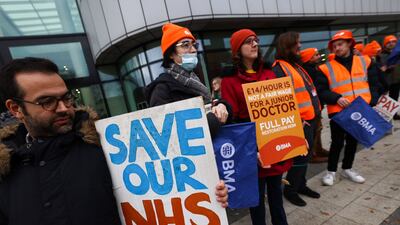British healthcare faces weeks of disruption as hospitals battle with rising winter rates of illness and a six-day strike by junior doctors that starts on Wednesday.
The walkout will be the longest strike in the National Health Service’s (NHS) history and is expected to have a significant impact not only on daily operations but long-planned operations and other appointments..
“This January could be one of the most difficult starts to the year the NHS has ever faced,” Sir Stephen Powis, national medical director of NHS England, said as he warned the impact of the strike will be felt for weeks.
“Six consecutive days of industrial action comes at one of our busiest periods – the action will not only have an enormous impact on planned care, but comes on top of a host of seasonal pressures such as Covid, flu, and staff absences due to sickness – all of which is impacting on how patients flow through hospitals,” he said.
On the back foot
“Our colleagues across the health service are doing their very best for patients every day with extensive preparations in place, but there's no doubt they are starting 2024 on the back foot – not only will action impact next week, it will continue to have a serious impact in the weeks after as we recover services and deal with additional demand.”
Junior doctors are set to walk out from 7am on January 3 until 7am on January 9 – amounting to 144 consecutive hours of industrial action.
The British Medical Association (BMA) union wants junior doctors to get a 35 per cent pay rise, which it says would restore their real earnings to 2008 levels, but the government says this is unaffordable.
Hopes the walkout could be called off are fading as a “stand-off” between the government and the BMA is holding firm, according to NHS Confederation chief executive Matthew Taylor.
He told BBC News on Monday that “even at this late stage, an intervention could make a difference”, and the industrial action will leave hospitals, GP surgeries and other services “skating on very thin ice”.
Mr Taylor said: “Unfortunately it feels like there is a stand-off, which is the government refusing to enter negotiations unless the junior doctors call off the strike action, and the junior doctors are refusing to call off strike action unless the government commits to investing more money – and that is a pity.
“These days are going to be very damaging to us.”
An agreement allows striking junior doctors to be recalled for major incidents and in extreme circumstances.
The confederation is urging the BMA to respond quickly to requests for junior doctors to be recalled and for the judgment of senior medics to be “trusted” when they say they need cover from those on strike.
Mr Taylor said: “Many NHS trusts will have thin rotas and will be in a highly vulnerable position as they enter what is widely regarded as the busiest week of the year for local NHS services.
Junior doctors across England begin 96 hour strike – in pictures
“Parts of the NHS will be skating on very thin ice, and they will need the BMA to back any recall requests for junior doctors when services find themselves under extreme pressure.”
He said under these circumstances, the focus must now be for every NHS leader and their staff to try to mitigate “as many of the considerable risks that they face as possible”.
He added: “To face almost 150 hours of continuous stoppages is a serious and unprecedented risk – and one that NHS leaders and their staff have never experienced before.
“That means more delays for patients who have faced lengthy waits for routine treatment.”
Figures released last month showed more than 1.2 million appointments have had to be postponed because of industrial action in the NHS since it began in December 2022. Strikes by junior doctors last month alone caused around 86,000 appointments to be postponed.











